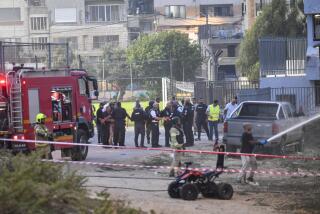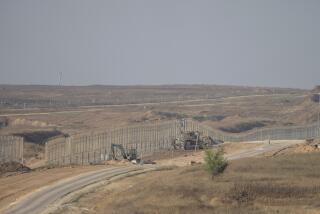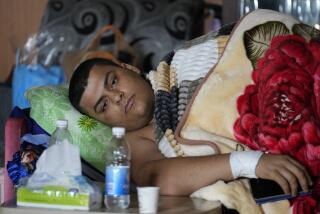Youths playing ball killed in Baghdad
- Share via
BAGHDAD — Explosives rained down on a dusty soccer field in the Shiite Muslim slum of Sadr City on Wednesday, killing eight Iraqi youths and injuring dozens.
Around the country, bombings and shootings left dozens of other Iraqis dead. The U.S. military reported that two of its troops had been killed, raising to at least 2,839 the number of American service members killed in Iraq.
Mortar and rocket battles reminiscent of the urban civil warfare that engulfed Sarajevo, Beirut and Kabul in previous decades have erupted occasionally throughout Baghdad’s patchwork of religiously mixed neighborhoods.
The latest fighting in northern and eastern Baghdad began Sunday, with sporadic fire between adjacent districts.
The attack on the soccer field, carried out with rockets or mortar shells, occurred about 4:30 p.m. The explosives carved deep craters into the surface and scattered shrapnel, human flesh and pieces of clothing. The injured and dying were taken to hospitals.
Exchanges of mortar fire between Shiite and Sunni neighborhoods left three other people dead and five injured in the northern district of Kadhimiya and one dead and 20 injured in the neighboring Adhamiya district.
Kadhimiya, a mostly Shiite area west of the Tigris River, is home to a golden-domed shrine that is among the most revered by Shiites. Adhamiya, a heavily Sunni neighborhood on the opposite bank of the Tigris, is the site of a famous Sunni shrine.
A suicide bombing at a cafe the night before in the nearby Shiite neighborhood of Grayat killed 21 people and injured 25, officials said. That bombing followed a mortar attack that killed seven in Adhamiya.
Iraq’s Shiite-led government, apparently discounting evidence that the violence was between Shiite and Sunni neighborhoods, blamed the outbreak of shelling on Sunni insurgents firing from the city of Taji, about 20 miles north of the capital.
“Baathists and [religious extremists] are launching mortars from Taji onto Adhamiya and Kadhimiya,” a statement said. The Russian-made mortars used by Iraqi insurgents, however, generally have a maximum range of five miles.
Explosions shook the capital throughout much of the day. A car bomb in the mostly Sunni neighborhood of Waziriya killed one person and injured six.
Another car bomb targeting a passing Iraqi police commando patrol in east Baghdad killed one police officer and injured four.
Mortar rounds struck the downtown Shorja wholesale market, killing two people and injuring eight. A mortar round also struck near the Health Ministry, killing three and injuring six.
At least 29 bodies were found around Baghdad. Many of the victims had been bound, beaten and shot in apparent sectarian reprisal killings.
Outside the capital, violence raged on.
A car bomb in a crowded market near Muqdadiya killed four people and injured six. The area is in the volatile, religiously mixed agricultural province of Diyala, northeast of Baghdad.
A roadside bomb exploded near a girls high school in Fallouja, 35 miles west of Baghdad, killing two students and injuring 12.
The most seriously wounded were rushed to the capital because the Fallouja hospital lacks resources, said Kamal Issawi, director of the facility.
“We are calling on international organizations and the government to solve our problems,” he said.
An explosion in a residential neighborhood of Hillah, about 60 miles south of the capital, left at least four people dead.
A city councilman in Hillah said Sunni insurgents had driven 75 Shiite families out of the nearby district of Iskandariya over the last two days.
He alleged that the insurgents kidnapped eight young Shiite men and killed an old man who confronted them.
They also destroyed two small Shiite shrines.
“They consider Iskandariya part of their Islamic state,” said Mohammed Masoudi, head of the Hillah City Council.
The Americans were killed in separate incidents. A Marine assigned to serve with the Army’s 1st Armored Division died Wednesday of wounds sustained “due to enemy action” in Al Anbar province, the military said.
A soldier with the 25th Infantry Division was killed Tuesday in combat near the northern city of Kirkuk. Three soldiers were also wounded during the operation, the military said.
Meanwhile, the trial of Saddam Hussein on genocide charges resumed with witness testimony and a defense allegation that the prosecution had broken into its offices and stolen files.
In a heavily guarded courtroom, Hussein’s accusers recounted the alleged crimes of the former regime in the infamous Anfal campaign, in which Iraqi security forces waged war on rebellious Kurdish villagers.
Badie Aref, an attorney for one defendant, accused the court of stealing documents crucial to its case.
“There were 23 files of documents that have disappeared,” he said. “I think that they were taken by the Americans, and I think that they might have given them to somebody from the prosecution.”
The judge dismissed the accusation.
The case was adjourned until Nov. 27.
*
Times special correspondents in Baghdad, Baqubah, Fallouja and Hillah contributed to this report.
More to Read
Sign up for Essential California
The most important California stories and recommendations in your inbox every morning.
You may occasionally receive promotional content from the Los Angeles Times.










